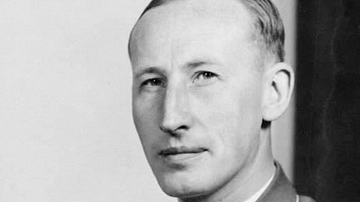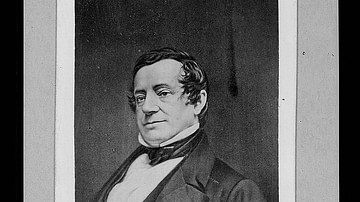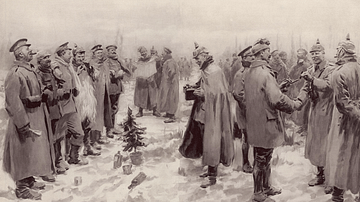Search Definitions
Browse Content (p. 20)

Definition
James Madison
James Madison (1751-1836) was a statesman, diplomat, and a Founding Father of the United States, who served as the fourth US president from 1809 to 1817. He played an important role in the drafting of the United States Constitution and the...

Definition
Ancient Jordan
Jordan is a country in the Near East bordered by Israel, Syria, Iraq, and Saudi Arabia. The country's name comes from the Arabic Al Urdun, referencing a fortified site but also meaning "prominence", though various sources also claim the name...

Definition
Quran
The Quran (also written Qur’an or Koran), revealed in the 7th century, is the sacred book of Islam, following in the tradition of the Abrahamic faiths, with the Torah as the sacred book of Judaism and the New Testament as the sacred book...

Definition
Phoney War
The Phoney War was the period from the start of the Second World War (1939-45) when Britain and France declared war against Germany on 3 September until the start of significant military action in the West in the spring of 1940. While Poland...

Definition
Reinhard Heydrich - The Infamous Head of Hitler's Reich Security
Reinhard Heydrich (1904-1942) was a lieutenant-general in the Nazi SS organisation, Gestapo chief, and head of Reich security. A favourite of Adolf Hitler (1889-1945), Heydrich controlled all police activity in the Third Reich and was instrumental...

Definition
Washington Irving
Washington Irving (1783-1859) was an American author, essayist, and diplomat best known for his short stories The Legend of Sleepy Hollow and Rip Van Winkle. He was the first professional American author and also the first to achieve an international...

Definition
The Christmas Truce - When the Fighting Paused in World War I
The Christmas Truce of 1914 occurred on the Western Front during the First World War (1914-18). On Christmas Eve soldiers in the trenches spontaneously agreed to a ceasefire. Beginning with the singing of Christmas carols, the unofficial...

Definition
Anglo-Saxon Warfare
Anglo-Saxon warfare was characterised by frequent and violent conflicts between petty kings, which ultimately led to the rise of larger kingdoms such as the Kingdom of Mercia, the Kingdom of Northumbria, and the Kingdom of Wessex. In early...

Definition
Adolf Hitler
Adolf Hitler (1889-1945) was the dictator of Nazi Germany from 1933. He gained power by making popular promises like improving Germany's economy and status in Europe, but when he took these policies too far, he was responsible more than anything...

Definition
Blitzkrieg - The Lightning War Tactic of Combined Arms
Blitzkrieg ('lightning war') is a military tactic combining air and land forces deployed at speed against the enemy's weaker points while the rear lines are simultaneously disrupted by acts of sabotage and bombing. Speed, concentration, and...